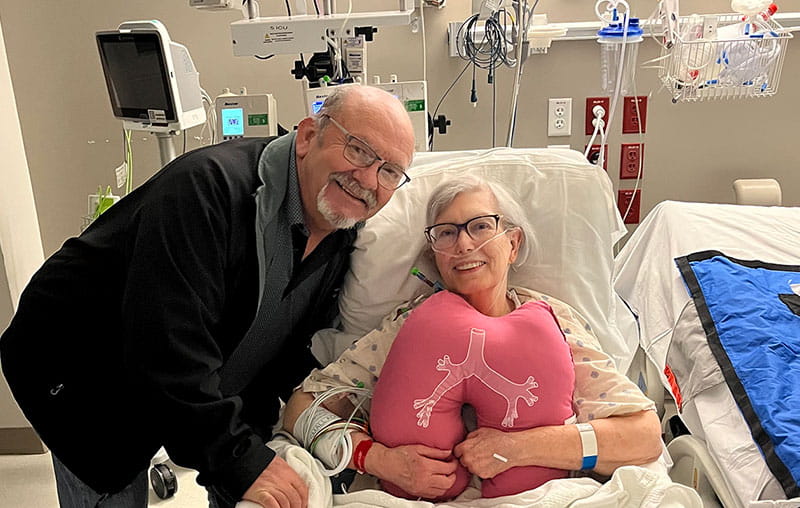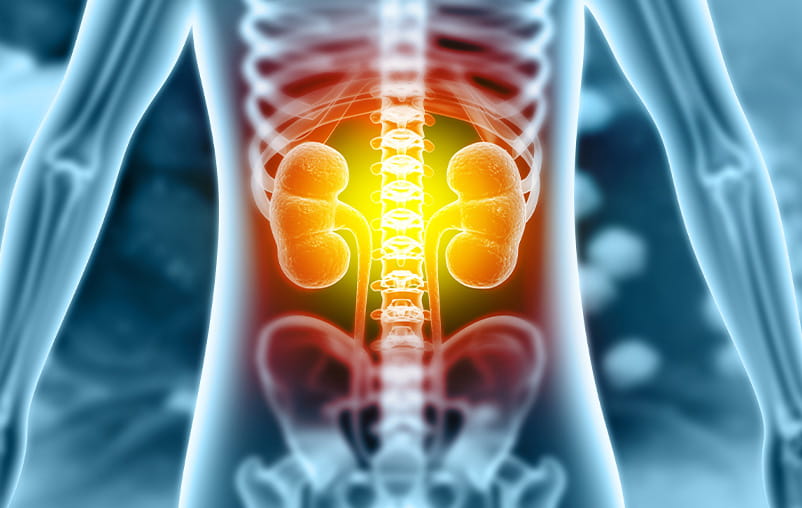Having kidney failure means that 85% to 90% of a person’s kidney function is gone. Unfortunately, the condition has no cure, so people with end-stage kidney disease will need dialysis or a kidney transplant in order to survive. The prevalence or total number affected by end-stage kidney disease, or kidney failure, in the United States is about 800,000 people.
“Kidney failure is a growing problem in this country, and the number of people living with end-stage kidney disease is increasing,” said Dr. Elizabeth Thomas, professor of surgery at UT Health San Antonio and director of the Living Kidney Donor Program at University Health Transplant Institute.
“It is well-proven that kidney transplantation is the best treatment for end-stage renal disease. Because of advancements in renal care, more people with kidney failure are qualifying to receive a kidney transplant. This is good news for a patient who will have an opportunity at a longer, higher quality life. But it also means that access to kidney transplantation is more competitive,” Dr. Thomas said.
While most transplant organs come from deceased donors, receiving a living donation is the quickest way for patients to secure the life-saving kidney they need. Compared to a deceased donor kidney, a living donor kidney starts working faster, lasts longer and can add more years to a patient’s life.
Nearly 7,000 Americans became living organ donors in 2023, with the vast majority of them donating one of their kidneys.
Treatment Options for Kidney Failure
Many chronic diseases can cause kidney failure, with the most common being diabetes and high blood pressure. People with kidney failure have two options for treatment: dialysis or kidney transplant. Dialysis performs the functions of a normal kidney by removing waste products and extra fluid from the blood. However, survival rates on dialysis are poor.
“The mortality rate on dialysis is on average greater than 50% in five years, which is worse than breast cancer and colon cancer,” Dr. Thomas said. “And while kidney transplant is not a cure for renal failure— as it takes effort and dedication to manage and care for a new kidney — it is far superior to dialysis in terms of outcomes for a patient.”
Unfortunately, there are not enough deceased donors to transplant all the people who need a kidney to survive. Currently, about 93,000 men, women and children are on the national kidney transplant waiting list. Wait times, which is dependent on many factors, are estimated to be anywhere from 4 to 10 years before reaching the top of the list for a deceased donor kidney transplant, according to Thomas.
“If a patient can do the work of finding a living donor, that wait time is eliminated. A patient will quite literally be pulled out of that line and scheduled for a kidney transplant,” she said.
How to Find a Living Kidney Donor
More than 6,000 living kidney donor surgeries are performed each year in the United States. Living donors do not have to be blood relatives to be a compatible kidney match with a recipient. Many distant relatives, friends, co-workers, or even strangers have become living donors.
Living Kidney Donor Criteria
Living kidney donors must:
- Be between the ages of 21 and 70
- Go through an evaluation and testing process
- Have a stable living situation with family or social support
- Have good overall mental and physical health
- Understand the risks and possible complications of kidney donation
Asking someone else for an organ seems unthinkable for many people. But simply sharing your story with others — starting with family and friends, and later expanding more broadly to outer social circles — can help start the conversation. All living donor medical expenses, including evaluation and surgery, are covered by the recipient’s health insurance.
Research has shown that having a living donor champion increases a person’s chances of finding a living donor. A living donor champion is someone who is willing to advocate for a patient on their behalf through activities like sharing stories and information about living donation via social media and other platforms.
“Many people find it difficult to ask someone to be their donor. By utilizing resources like a living donor champion, finding a living donor can be easier. Regardless of how a patient finds a living donor, the most important thing is that they do,” Dr. Thomas said. “The impact of this effort cannot be overstated. Living donor kidney transplant results in a patient receiving the best possible kidney and receiving it sooner than waiting for a deceased donor.”
Cynthia and Rewelyn's Transplant Story 
Cynthia and Rewelyn were both diagnosed with the same autoimmune disease, IgA nephropathy, a condition that threatened their lives by attacking their kidneys. But in the face of this life-altering diagnosis, their husbands became their heroes, stepping forward as living kidney donors. Though their kidneys weren't compatible with their spouses, these couples found hope through our paired exchange program. This allowed them to save each other's lives, and a year after their transplants, they finally met, bonded by their similar circumstances.
Cynthia shared this deeply touching message with her donor, “Thank you is not enough for the selfless gift you have given me. Words cannot capture the depth of my gratitude. Please know I will cherish this part of you every day, and I will live a life that honors your incredible gift.”
Kidney Transplant Care at University Health
University Health Transplant Institute, a partnership between the University Health and UT Health San Antonio, has performed more than 6,000 transplants since opening more than 40 years ago, ranking among the top in kidney transplant patient outcomes and survival rates in South Texas.
Our Champion for Life program has been nationally recognized by Donate Life America for its excellence in patient advocacy. We also lead the nation in pediatric living kidney donor transplants.
Learn if you’re eligible to be a donor and how to take the first step to become a living kidney donor at University Health Transplant Institute.





